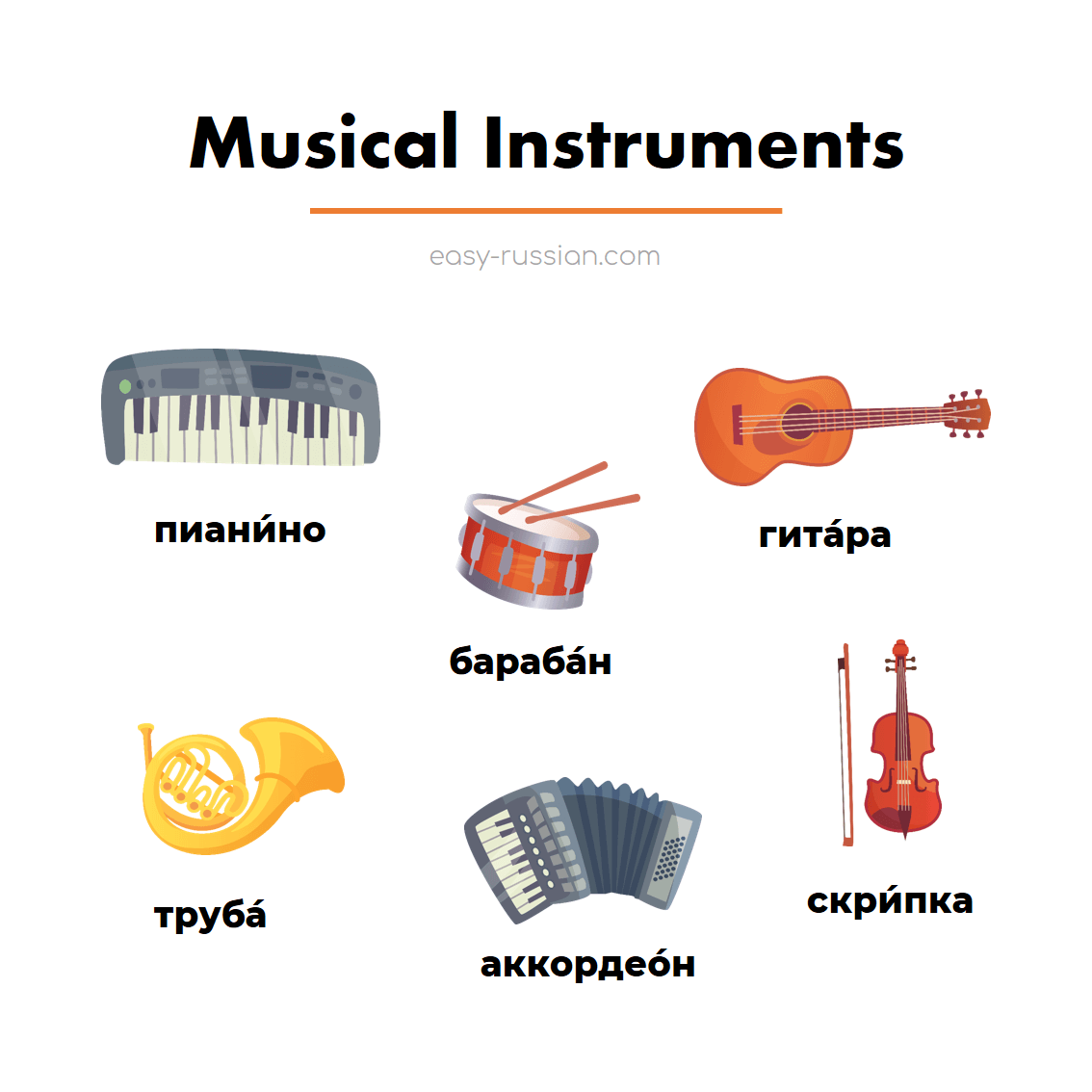Speak Like a Musician: Key Words for Discussing Music in Russian
Get ready to sing louder and dance faster as we dive into the world of Russian music (музыка)! To truly understand Russian culture and people, you need to learn basic music terminology in the Russian language.
In this article, we will explore names of musical instruments, popular genres, important verbs, and theoretical concepts so you can not only listen to but describe melodies in the language of Tchaikovsky and Rachmaninoff. So tune your instruments and get ready to sing in Russian!
Musical Instruments
When talking about music in Russian, it’s important to know the names of common instruments. Here are some of the most frequently used musical instruments in Russian.
Common orchestral instruments in Russian:
скрипка – violin
виолончель – cello
контрабас – double bass
флейта – flute
гобой – oboe
кларнет – clarinet
фагот – bassoon
валторна – trench horn
труба – trumpet
тромбон – trombone
туба – tuba
Common band instruments in Russian:
саксофон – saxophone
труба – trumpet
тромбон – trombone
барабаны – drums
гитара – guitar
бас-гитара – bass guitar
Other common instruments:
фортепиано/пианино – piano
рояль – grand piano
арфа – harp
банджо – banjo
бубен – tambourine
аккордеон – accordion

In addition to these more well-known instruments, Russia has some traditional and folk instruments that are important in Russian music:
Balalaika (балалайка) – a three-stringed folk instrument that produces a distinctive triangular shape and bright sound.
- Bayan (баян) – a Russian accordion that is an essential instrument for folk and traditional music.
- Garmon (гармонь) another type of Russian accordion that can be diatonic or chromatic.
- Gusli (гусли) an ancient Russian folk instrument, a triangular zither with plucked metal strings.
- Svirel (свирель) a wooden Russian flute most often used in folk music.
- Gudok (гудок) a pear-shaped three-string fiddle from Russia without a fingerboard.
Some other important Russian instruments are the domra (домра), a Russian lute, and the zhaleika (жалейка), a bassoon-like woodwind.
As you can see, Russia has given the world many unique musical instruments that every Russian learner should know. Learning the names of these instruments will help immerse you in the country’s musical tradition and culture.
See Also: Vocabulary for Hobbies and Free Time
Music Genres
Knowing the Russian names for different music genres is great for being able to discuss your listening preferences. Here are some of the most popular music genres in Russian:
поп – pop
рок – rock
джаз – jazz
блюз – blues
кантри – country
метал – metal
панк – punk
хип-хоп – hip hop
рэп – rap
регги – reggae
диско – disco
шансон – chanson
рок-н-ролл – rock and roll
фолк/народная музыка – folk
классика – classical
опера – opera
электронная музыка – electronic
инди – indie
Russia has a diverse musical landscape that blends its own unique traditions with contemporary global trends. While the nation has produced distinct Russian-language pop acts, several genres like rock, electronic dance, and hip hop have become popularized through both foreign and domestic interpretations.
One distinctly Russian genre is bard music (бардовская песня), an emotional style of sung poetry pioneered by singer-songwriters like Bulat Okudzhava, Vladimir Vysotsky, and others during the Soviet period. These bards wrote introspective, metaphorical folk-style songs that often provided social commentary.
Russian chanson is another exclusively Russian genre that is modelled after French chanson music and has a more mainstream, pop-oriented sound. The lyrics frequently deal with themes of criminal life, romance, and destiny. Some notable Russian chanson artists are Mikhail Krug, Mikhail Shufutinsky, and Alexander Rosenbaum.
Rock music has also carved out a strong presence in Russia since the 1980s. Hard rock, heavy metal, and punk bands like Aria, Alisa, and DDT gained huge followings during years when Western rock was hard to access. Russian rock carries on the gritty, protest spirit of the earlier bard music, fused with electric guitars and amplifiers. Folk and folk-rock fusions are also common, connecting back to Russia’s heritage.
More recently, contemporary styles like electronic dance music, rap, and hip hop have become very popular, especially among youth culture in major cities. As Russia continues to globalize, its own DJs, rappers, and producers have emerged in these genres, bringing a distinct Russian twist through their lyrics and attitudes. The diverse musical landscape of Russia contains both quintessentially Russian styles and adaptations of international influences. However, music remains a cultural force and source of pride.

Key Verbs for Music
Verbs are important in Russian for being able to express yourself musically. Here are some of the most essential Russian verbs for talking about music:
слушать – to listen (to music)
играть (на) – to play (an instrument)
петь – to sing
танцевать – to dance
выступать – to perform
дирижировать – to conduct
бренчать – to strum (a guitar, etc.) [spoken]
напевать – to sing/vocalize a melody
подпевать – to sing backup
крутить – to spin/play (music)
писать музыку – to write music
импровизировать – to improvise
Using these verbs allows you to discuss playing instruments, singing songs, listening to music, composing, and dancing in Russian. Work on conjugating them properly when speaking about musical activities.
See Also: 100 Verbs Every Intermediate Russian Learner Should Know
Music Theory Terms
Understanding music theory vocabulary opens up discussion about the technical elements of music. Here are some essential Russian music theory terms:
звук – sound
мелодия – melody
ритм – rhythm
темп – tempo
гармония – harmony
гамма – scale
тональность – tonality/key
звукоряд – scale
лад – mode
интервал – interval
аккорд – chord
октава – octave
ключ – key signature
нота – note
партитура – sheet music/score
такт – measure/bar
композитор – composer
музыкант – musician
гитарист – guitar player
пианист – pianist
барабанщик – drummer
исполнитель – performer
соло – solo
ансамбль – ensemble
оркестр – orchestra
Now you have the basics to understand and describe the wonderful world of Russian music. Remember the key terms, learn to use the important verbs, and you’ll be able to not only enjoy the sounds but have engaging discussions about music with native speakers. Musical knowledge will open the door to the rich Russian culture for you. So play your favorite Russian tune and keep singing and dancing in Russian!
